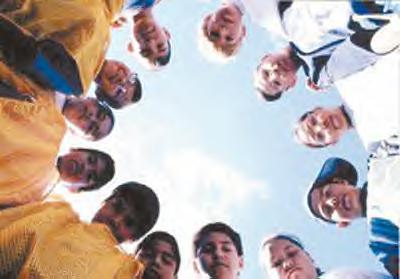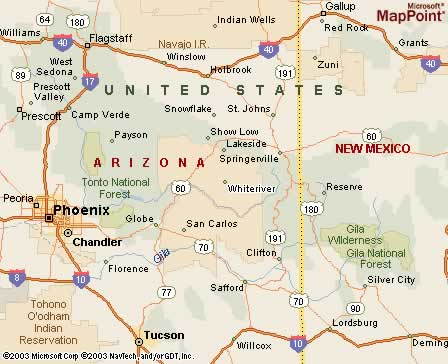|
|
Canku Ota |
|
|
(Many Paths) |
||
|
An Online Newsletter Celebrating Native America |
||
|
July 26, 2003 - Issue 92 |
||
|
|
||
|
Native Visions |
||
|
by Patti Jo King Indian
Country Today
|
||
|
credits: Former NFL kicker, Nick Lowery, was influential in developing the Native Vision program for reservation communities. In an attempt to inspire and empower children and youth, like those pictured above, the program offers workshops, camps and cultural festivities. (Photo courtesy Native Vision) |
|
The program became known as "Native Vision" and now encompasses five sports including soccer, baseball, basketball, and volleyball as well as football. Together with help from the NFLPA, Lowery began to build a formidable youth development program that positively serves targeted Native American reservation communities throughout the entire year. The program became so successful that Ret. General Colin Powell, leader of the 1997 President’s Summit for America’s Future, was prompted to call it, "One of the very best initiatives in the country for disadvantaged youth." The year-round Native Vision program was officially introduced in 1998 in Wyoming on the Northern Arapaho-Eastern Shoshone Wind River Reservation, where 240 youths from tribes across Indian country assembled to take part in the third annual Native Vision Sports and Life Skills Camp. The Wind River camp also included workshops on parenting, educational uses of the Internet, food distribution for underprivileged families, and community cultural festivities. Seven years after its initial conception, Native Vision is now serving some 30 tribes across America. Its focus on the well-being of the entire family and the larger community has made it a hallmark of achievement for the more than 750 youths that attend each year. Lowery says the program is designed to help Indian youth solve their own challenges in health and community and tell their own stories of vision, courage, strength, and unity. A former professional football player with the Kansas City Chiefs and the New York Jets, Lowery has spent 23 years working to empower America’s youth; the last eight years he has focused primarily on the Indian community. "It’s a real challenge because Indian communities are comprised of 562 nations, all with language and cultural differences." he said. "One of the blessings of being a pro-athlete is that you have opportunities to inspire young people to think about themselves - you can raise the bar a little." As president of the Nick Lowery Foundation and as a co-founder of the "Nation Building for Native Youth" association, he is dedicated to organizing and promoting volunteerism and community wellness among members of Indian nations. He believes that working to empower youth is the best way to support the entire community. To achieve his goals for Native Vision, Lowery has teamed up with the Center for American Indian and Alaskan Native Health who designs, implements and evaluates the program; the John Hopkins Center for American Indian Health which employs local program coordinators on participating reservations; and the NFL Players Association which assists with fund-raising activities, management of the annual sports camp, and recruitment of the professional athletes who participate in Native Vision community activities. Additional support is provided by actor Robert Redford, the Kodak Company, the W.K. Kellogg Foundation, Tom Brown Inc., Sports Illustrated, and many other generous supporters. Lowery says all kids deserve a healthy start in life, and he believes that the best way to ensure that start is by concentrating support on four basic components that contribute to the personal growth and success of an individual: Emotional, by increasing self-esteem; Mental, by improving educational and life skills; Physical, by improving nutrition and fitness while addressing drug and alcohol issues; and Spiritual, by empowering cultural identity through increased involvement with parents, elders, and mentors. He says the primary focus of the sports camp is always on the kids and the community, and he points out, "The real heroes are the members of the local community who will become lifetime mentors for the children involved." He also advocates for increased youth involvement in community. "It is important for kids to be involved. As youngsters, they are looking for role models, and their sense of identity is not always strong enough to make the best choices. They need a connection to something that will never change a sense of belonging community. The Indian nations have a tremendous sense of community and belonging and kids want to be included. They also need to develop a strong self-identity as individuals and to be rewarded for their capacity to give back to their own people." He says the key to making the connection is encouraging parents to become active participants in the process. "Kids want to be a part of defining what tradition is about today. When you ask more of them, they respond," he said. Lowery is also a founding board member of the American Indian Education Foundation (AIEF), established by Congress in 2000. AIEF helps provide school supplies for K-12 students; funds for structural improvements and repairs for BIA schools; retention and incentive programs to help reduce the Native drop out rate; and scholarships, mentoring and support for Indian college students. As the first professional athlete-graduate of Harvard University’s Kennedy School of Government, and a research fellow at the Harvard Project on American Indian Economic Development, he is also implementing a pilot curriculum in Nation Building for Native youth to help promote self-governance, leadership, and the opportunity for kids to give back to their community. "It is not the intensity of the spotlight placed on an individual, but the brightness of the light within that is the ultimate measure of a human being," he adds. Native Vision has also expanded to include workshops on computer literacy, art and media. Additional emphasis has been placed on family and community wellness through programs like the John Hopkins-sponsored Changing Our Lives Through Sharing Our Strength (SOS) program. SOS addresses the issues of teen parents. While teen mothers learn the basics of healthy pregnancy and baby care, teen fathers benefit from the Father’s Project, which helps enable them to actively participate in family life, support their children and fulfill their own personal goals. Again, the overall objective is to help these kids become community mentors themselves. "If I could deliver one message to Native kids," Lowery said, "it would be that they can do absolutely anything they want without compromising their tribal traditions. Some call it the fulfillment of hopes for the seventh generation. You can take a true leadership position in the world community today simply by the way you live your life. Start your story. Live your legacy." |
|
|
www.expedia.com |
|
|
||
|
|
||
| Canku Ota is a free Newsletter celebrating Native America, its traditions and accomplishments . We do not provide subscriber or visitor names to anyone. Some articles presented in Canku Ota may contain copyright material. We have received appropriate permissions for republishing any articles. Material appearing here is distributed without profit or monetary gain to those who have expressed an interest. This is in accordance with Title 17 U.S.C. Section 107. | ||
|
Canku Ota is a copyright © 2000, 2001, 2002, 2003 of Vicki Lockard and Paul Barry. |
||
 |
 |
|
|
The "Canku Ota - A Newsletter Celebrating Native America" web site and its design is the |
||
|
Copyright © 1999, 2000, 2001, 2002, 2003 of Paul C. Barry. |
||
|
All Rights Reserved. |
||
 WHITE
RIVER, Ariz. - In
1995, National Football League Player’s Association (NFLPA)
member and all-star kicker Nick Lowery organized a remarkable
two-day event that would become one of the most outstanding Native
youth programs across Indian country. During this event, some
100 tribal children from 10 Indian nations participated in a sports
clinic designed to teach the fundamentals of football, and help
kids find ways to succeed in their life endeavors at the same
time. The overall goal of that first event was to deliver one
important message: In spite of many obstacles, anyone can achieve
greatness.
WHITE
RIVER, Ariz. - In
1995, National Football League Player’s Association (NFLPA)
member and all-star kicker Nick Lowery organized a remarkable
two-day event that would become one of the most outstanding Native
youth programs across Indian country. During this event, some
100 tribal children from 10 Indian nations participated in a sports
clinic designed to teach the fundamentals of football, and help
kids find ways to succeed in their life endeavors at the same
time. The overall goal of that first event was to deliver one
important message: In spite of many obstacles, anyone can achieve
greatness. 